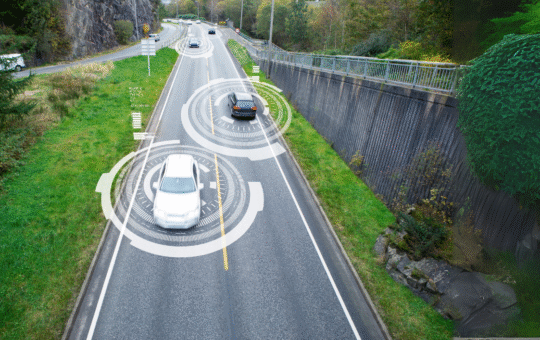
Level 6 Diploma in Sustainability and Green Technology in Automotive Engineering
- Gain expertise in sustainable automotive engineering, focusing on technologies that minimize environmental impact.
- Learn about alternative fuels, electric and hybrid vehicles, renewable energy sources, and energy-efficient vehicle design.
- Develop practical skills in the implementation of green technologies and sustainable practices in automotive manufacturing.
- Position yourself as a key player in the transition toward a greener and more sustainable automotive industry.
- Understand the principles of sustainable automotive engineering and its importance in reducing carbon emissions.
- Gain proficiency in the design and implementation of electric, hybrid, and alternative fuel vehicles.
- Learn about energy-efficient vehicle components, including regenerative braking, energy recovery systems, and lightweight materials.
- Develop an understanding of green manufacturing processes and how they contribute to sustainability in automotive production.
- Explore the role of renewable energy sources, such as solar and wind power, in automotive engineering.
- Introduction to Sustainable Automotive Engineering
- Overview of environmental challenges in the automotive industry.
- Key principles of sustainability and how they apply to vehicle design and manufacturing.
- Alternative Fuels and Powertrain Technologies
- Study of alternative fuel systems such as biofuels, hydrogen, and natural gas.
- Electric and hybrid powertrain systems: design, components, and integration into modern vehicles.
- Energy-Efficient Vehicle Design
- Techniques for improving vehicle energy efficiency, including aerodynamics, lightweight materials, and powertrain optimization.
- Role of regenerative braking and other energy-saving technologies in hybrid and electric vehicles.
- Sustainable Manufacturing and Materials
- Green manufacturing processes, waste reduction, and the use of renewable energy in vehicle production.
- Sustainable materials such as bio-based plastics, recycled metals, and sustainable composites.
- Renewable Energy Integration in Automotive Engineering
- Exploring the integration of renewable energy sources like solar panels in electric vehicles.
- Case studies of solar-powered vehicles and charging stations powered by renewable energy.
- Battery Technologies for Sustainable Vehicles
- In-depth study of battery technologies used in electric and hybrid vehicles, including lithium-ion and solid-state batteries.
- Energy storage systems, their lifecycle, and environmental impact.
- Environmental Impact and Lifecycle Assessment
- Understanding the environmental impact of vehicles through lifecycle assessment (LCA).
- Analyzing the carbon footprint of vehicles and exploring strategies for reducing emissions during production, use, and disposal.
- Policy, Legislation, and Future Trends in Green Automotive Engineering
- Overview of global environmental regulations, including emissions standards and governmental policies on sustainable transport.
- The future of sustainable automotive technologies, including autonomous vehicles, smart grids, and integration with electric infrastructure.
- Pursue advanced qualifications in sustainable transport systems, green technology engineering, or renewable energy applications.
- Work as a sustainable automotive engineer, green technology consultant, or energy systems specialist in automotive, energy, and manufacturing industries.
- Specialize in the design, development, and optimization of eco-friendly vehicles and sustainable manufacturing practices.
- Innovative Curriculum: Learn about cutting-edge green technologies and sustainable practices shaping the future of automotive engineering.
- Hands-On Learning: Gain practical experience through projects and simulations focusing on the real-world application of sustainability in automotive design.
- Expert Guidance: Learn from industry experts with deep knowledge in green technologies and sustainable vehicle engineering.
- Globally Recognized Certification: Enhance your career with a qualification valued by leading automotive manufacturers, energy companies, and sustainability-focused firms.
Study Units
- Introduction to Sustainable Automotive Engineering
- Overview of environmental challenges in the automotive industry.
- Key principles of sustainability and how they apply to vehicle design and manufacturing.
- Alternative Fuels and Powertrain Technologies
- Study of alternative fuel systems such as biofuels, hydrogen, and natural gas.
- Electric and hybrid powertrain systems: design, components, and integration into modern vehicles.
- Energy-Efficient Vehicle Design
- Techniques for improving vehicle energy efficiency, including aerodynamics, lightweight materials, and powertrain optimization.
- Role of regenerative braking and other energy-saving technologies in hybrid and electric vehicles.
- Sustainable Manufacturing and Materials
- Green manufacturing processes, waste reduction, and the use of renewable energy in vehicle production.
- Sustainable materials such as bio-based plastics, recycled metals, and sustainable composites.
- Renewable Energy Integration in Automotive Engineering
- Exploring the integration of renewable energy sources like solar panels in electric vehicles.
- Case studies of solar-powered vehicles and charging stations powered by renewable energy.
- Battery Technologies for Sustainable Vehicles
- In-depth study of battery technologies used in electric and hybrid vehicles, including lithium-ion and solid-state batteries.
- Energy storage systems, their lifecycle, and environmental impact.
- Environmental Impact and Lifecycle Assessment
- Understanding the environmental impact of vehicles through lifecycle assessment (LCA).
- Analyzing the carbon footprint of vehicles and exploring strategies for reducing emissions during production, use, and disposal.
- Policy, Legislation, and Future Trends in Green Automotive Engineering
- Overview of global environmental regulations, including emissions standards and governmental policies on sustainable transport.
- The future of sustainable automotive technologies, including autonomous vehicles, smart grids, and integration with electric infrastructure.
Upon completing this diploma, learners will:
- Understand the principles of sustainable automotive engineering and its importance in reducing carbon emissions.
- Gain proficiency in the design and implementation of electric, hybrid, and alternative fuel vehicles.
- Learn about energy-efficient vehicle components, including regenerative braking, energy recovery systems, and lightweight materials.
- Develop an understanding of green manufacturing processes and how they contribute to sustainability in automotive production.
- Explore the role of renewable energy sources, such as solar and wind power, in automotive engineering.
This diploma is crafted for professionals and aspiring specialists committed to driving sustainability in the automotive industry. It is ideal for:
Sustainable Automotive Engineers
Individuals involved in the design and development of environmentally responsible vehicles and systems seeking to deepen their expertise in green technologies.
EV/HEV Developers and Innovators
Engineers and technologists focusing on electric, hybrid, or alternative fuel vehicle systems who want to integrate sustainability into their design and manufacturing processes.
Manufacturing and Production Engineers
Professionals looking to adopt sustainable manufacturing practices, reduce emissions, and implement eco-friendly materials in vehicle production.
Environmental Engineers and Analysts
Those working in environmental impact assessment, emissions control, or lifecycle analysis who want to specialize in automotive applications.
Policy Advisors and Regulatory Professionals
People involved in shaping automotive and environmental regulations who need a strong understanding of sustainable vehicle technologies and global green standards.
Automotive R&D and Innovation Teams
Research and development professionals engaged in the next generation of green automotive solutions, from lightweight vehicle design to renewable energy integration.
Graduates in Engineering and Environmental Sciences
Students and recent graduates aiming to build a career in green automotive engineering, clean energy, or sustainable transport systems.
Our assessment process is designed to ensure every learner achieves the required level of knowledge, skills, and understanding outlined in each course unit.
Purpose of Assessment
Assessment helps measure how well a learner has met the learning outcomes. It ensures consistency, quality, and fairness across all learners.
What Learners Need to Do
Learners must provide clear evidence that shows they have met all the learning outcomes and assessment criteria for each unit. This evidence can take different forms depending on the course and type of learning.
Types of Acceptable Evidence
Assignments, reports, or projects
Worksheets or written tasks
Portfolios of practical work
Answers to oral or written questions
Test or exam papers
Understanding the Structure
Learning outcomes explain what learners should know, understand, or be able to do.
Assessment criteria set the standard learners must meet to achieve each learning outcome.
Assessment Guidelines
All assessment must be authentic, current, and relevant to the unit.
Evidence must match each assessment criterion clearly.
Plagiarism or copied work is not accepted.
All learners must complete assessments within the given timelines.
Where applicable, assessments may be reviewed or verified by internal or external quality assurers.
Full learning outcomes and assessment criteria for each qualification are available from page 8 of the course handbook.
Top Courses
No results found.
Related Courses
Let's Get in touch
Deleting Course Review
Course Access
This course is password protected. To access it please enter your password below:



